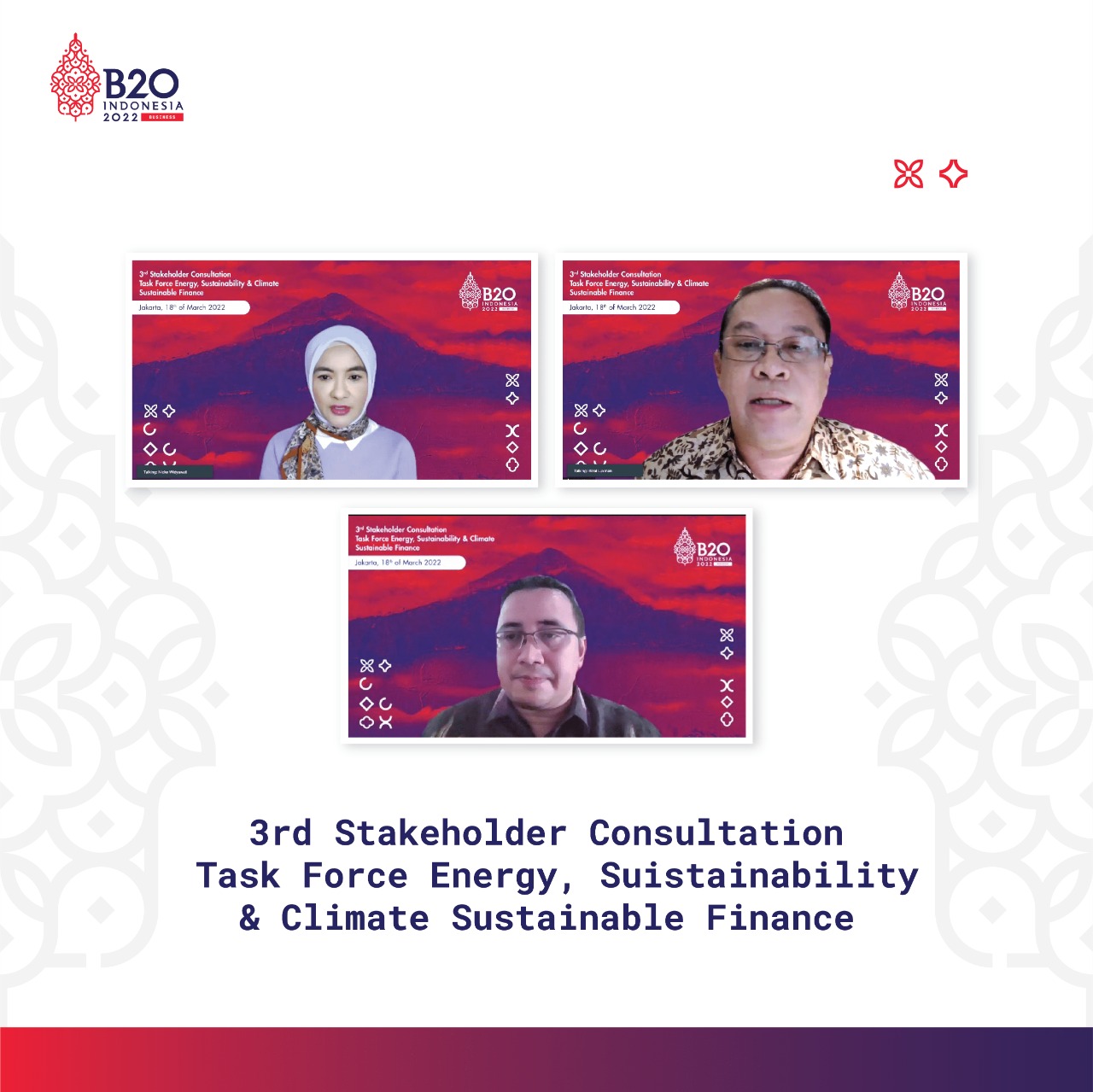
3rd Stakeholder Consultation: Energy, Sustainability, & Climate B20 Task Force Focuses on Increasing Access to Energy Transition Financing
Jakarta, March 22, 2022 - The third Stakeholder Consultation, Energy, Sustainability, & Climate B20 Task Force held in Jakarta on Friday (18/3) focused on increasing financial support to accelerate the energy transition.
The 3rd Stakeholder Consultation was carried out to obtain input from stakeholders so that the policy recommendations formulated could represent the views of business actors/financial sector institutions. Stakeholders are expected to provide input on priority issues brought by the Energy, Sustainability, & Climate B20 Task Force.
Chair of Energy, Sustainability, & Climate B20 Task Force, Nicke Widyawati, said the topic of discussion at the 3rd Stakeholder Consultation focused on financing aspects, mainly related to global cooperation in channeling and the availability of large-scale financing for energy transition investments.
"The exchange of views during this Stakeholder Consultation will enrich the process of forming Energy Task Force recommendations to the G20," Nicke said in front of the 3rd Stakeholder Consultation participants, Energy, Sustainability, & Climate B20 Task Force, Friday (18/3).
According to Nicke, the main issues discussed in the 3rd Stakeholder Consultation include global cooperation for the carbon market and funds distribution to finance the energy transition and how to apply sustainable reporting standards and globally recognized taxonomies. The Stakeholder Consultation was also attended by speakers from various financial institutions, namely the World Bank, MUFG Bank, Global Reporting Initiative (GRI), International Federation of Accountants (IFAC), World Research Institute (WRI) as Network Partners, and PwC and BCG as Knowledge Partners in the Task Force.
Nicke added that globally, the energy sector is a sector that has the most critical challenges to switch to sustainable energy as an effort to reduce carbon emissions that cause greenhouse gases.
“The conditions in Indonesia are slightly different because carbon emissions contribution from energy ranges from 20% - 36% compared to deforestation, which ranges from 44% - 62%. However, this cannot be an excuse for industry players, especially in the energy sector, not to participate in reducing greenhouse gas emissions,” said Nicke.
Referring to the IPCC forecast, Nicke said the current global average temperature rise was already close to the consensus threshold of 1.5 degrees Celsius.
"There is little time left to take drastic action to reduce the acceleration of peak emissions to net zero, which is currently lagging significantly," stated Nicke.
As the Chair of Energy, Sustainability, & Climate B20 Task Force, Nicke proposes three policy recommendations that must be a shared focus to suppress the acceleration of the current global warming rate.
First, accelerate the transition to sustainable energy utilization by increasing global cooperation to accelerate the transition to sustainable energy utilization through reducing carbon intensity in energy utilization.
Second, ensure a just and affordable transition by enhancing global cooperation to ensure a fair, orderly, and affordable transition to sustainable energy utilization across developed and developing countries.
Third, conducting global cooperation in increasing energy security by encouraging global cooperation to improve energy security at the consumer level through providing access and the ability to consume clean and modern energy.
Nicke revealed that the formulation of this Policy Recommendation involved several parties in the Energy, Sustainability, & Climate B20 Task Force. It includes 8 Co-Chairs who are C-Levels of business actors from G20 countries and more than 140 Members, who provide input in the direction of Policy Recommendations and priority issues.
"The most important thing in formulating this recommendation is alignment with stakeholders so that the issues we bring to the task force can be in line with Indonesia's policy direction at the G20," Nicke said.*
On the same occasion, Deputy for International Cooperation Coordination, Coordinating Ministry for Economic Affairs, who also serves as B20 Sherpa, Dr. Rizal Affandi Lukman, said that this ongoing stakeholder consultation is very important to gather relevant information ideas and insights from various relevant stakeholders.
"From the beginning, the ESC Task Force was the most popular task force in Indonesia's B20 presidency. This is a strong signal that energy, sustainability, and climate issues are relevant for many parties today," said Rizal.
Through these discussions, he encouraged that the results could be carried out further.
"Let us be more open and critical today because all of us are involved as sources of valuable information that can be used. In the future, of course, there will be strong collaboration and partnerships in producing good policy recommendations for all," stated Rizal.**